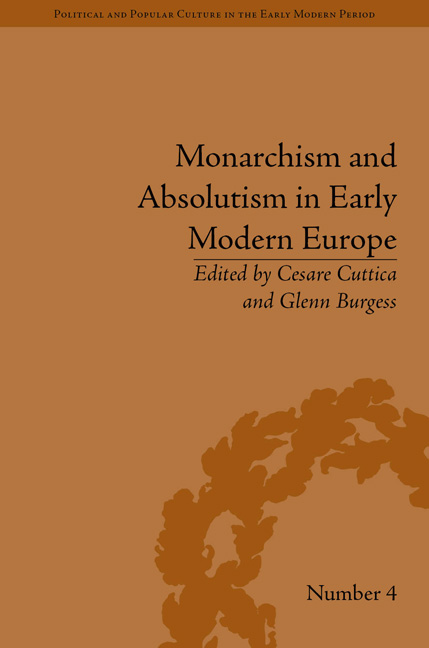Book contents
- Frontmatter
- CONTENTS
- Acknowledgements
- List of Contributors
- Introduction: Monarchism and Absolutism in Early Modern Europe
- Part I Royalists, Republicans, Patriarchalists: English Thinkers at Odds in the Seventeenth Century
- Part II Absolutism, Cynicism, Patriotism: Eighteenth-Century Enlightenment Reflections
- Part III Absolutism, Monarchism, Despotism in Theory and Practice: Contested Historiography and Comparative Approach
- Part IV Monarchy, the State of Nature, Religion and Iconography in European Perspective
- 11 ‘Monstrous’ Pufendorf: Sovereignty and System in the Dissertations
- 12 Absolute Chaos, Absolute Order: The Rhetoric of the State of Nature in the Discourse of Sovereignty
- 13 Bayle on Brutus: A Paradoxical Issue?
- 14 ‘More Long-Lasting Than Bronze?’ Statues, Public Commemoration and Representations of Monarchy in Diderot's Political Thought
- Notes
- Works Cited
- Index
13 - Bayle on Brutus: A Paradoxical Issue?
from Part IV - Monarchy, the State of Nature, Religion and Iconography in European Perspective
- Frontmatter
- CONTENTS
- Acknowledgements
- List of Contributors
- Introduction: Monarchism and Absolutism in Early Modern Europe
- Part I Royalists, Republicans, Patriarchalists: English Thinkers at Odds in the Seventeenth Century
- Part II Absolutism, Cynicism, Patriotism: Eighteenth-Century Enlightenment Reflections
- Part III Absolutism, Monarchism, Despotism in Theory and Practice: Contested Historiography and Comparative Approach
- Part IV Monarchy, the State of Nature, Religion and Iconography in European Perspective
- 11 ‘Monstrous’ Pufendorf: Sovereignty and System in the Dissertations
- 12 Absolute Chaos, Absolute Order: The Rhetoric of the State of Nature in the Discourse of Sovereignty
- 13 Bayle on Brutus: A Paradoxical Issue?
- 14 ‘More Long-Lasting Than Bronze?’ Statues, Public Commemoration and Representations of Monarchy in Diderot's Political Thought
- Notes
- Works Cited
- Index
Summary
Setting out, as Pierre Bayle (1647–1706) did, to discover who was the real author of the Vindiciae contra tyrannos (1579) was, at the end of the seventeenth century, anything but a purely philological exercise. On the contrary, in the eyes of the contemporary reader and in Bayle's own hands, this incursion into the realm of history and philology had a significance steeped in politics. The Vindiciae continued to maintain intact the full subversive charge with which it had been read and interpreted over the course of an entire century, in different countries and against different historical backdrops: from the France of Henry III to Cromwell's England and amid the political battles and religious controversies that divided Holland between the sixteenth and seventeenth centuries.
Philology and politics
Announced in 1690, Pierre Bayle's Projet et fragmens d'un Dictionaire critique was not actually published until two years later, in the full flush of the dispute with his co-religionist Pierre Jurieu. The work contained, in the form of a fragment, the Dissertation concernant le livre d'Etienne Junius Brutus, imprimé l'an 1579, namely a critical and literary appraisal of the author or authors of the famous Vindiciae. In 1696 Bayle once more proposed the Dissertation to the public, among the appendix additions to his Dictionnaire historique et critique.
- Type
- Chapter
- Information
- Monarchism and Absolutism in Early Modern Europe , pp. 187 - 200Publisher: Pickering & ChattoFirst published in: 2014



